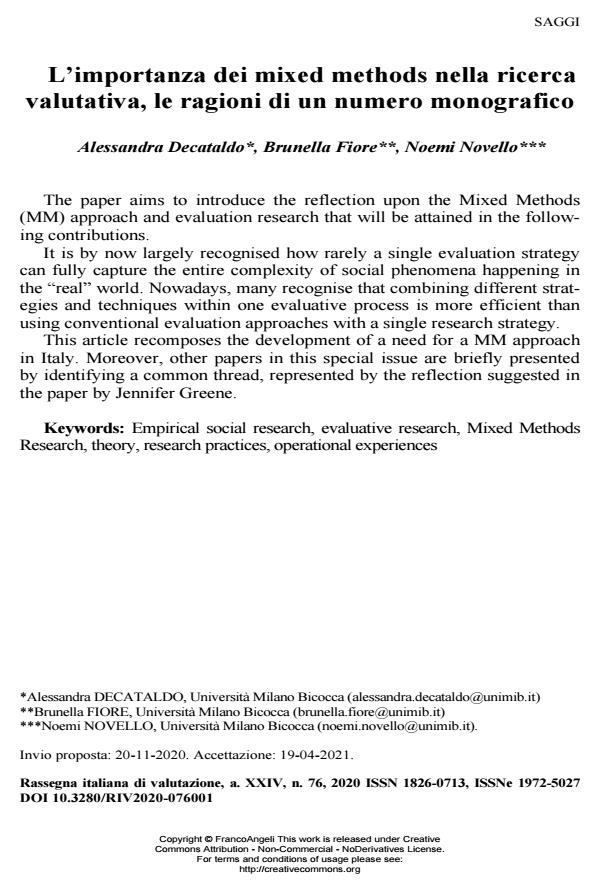L’importanza dei mixed methods nella ricerca valutativa, le ragioni di un numero monografico
Journal title RIV Rassegna Italiana di Valutazione
Author/s Alessandra Decataldo, Brunella Fiore, Noemi Novello
Publishing Year 2021 Issue 2020/76
Language Italian Pages 14 P. 5-18 File size 279 KB
DOI 10.3280/RIV2020-076001
DOI is like a bar code for intellectual property: to have more infomation
click here

FrancoAngeli is member of Publishers International Linking Association, Inc (PILA), a not-for-profit association which run the CrossRef service enabling links to and from online scholarly content.
The paper aims to introduce the reflection upon the Mixed Methods (MM) approach and evaluation research that will be attained in the fol-lowing contributions. It is by now largely recognised how rarely a single evaluation strate-gy can fully capture the entire complexity of social phenomena hap-pening in the "real" world. Nowadays, many recognise that combining different strategies and techniques within one evaluative process is more efficient than using conventional evaluation approaches with a single research strategy. This article recomposes the development of a need for a MM ap-proach in Italy. Moreover, other papers in this special issue are briefly presented by identifying a common thread, represented by the reflec-tion suggested in the paper by Jennifer Greene.
Keywords: Empirical social research, evaluative research, Mixed Methods Research, theory, research practices, operational experiences
- Bledsoe K.L., Graham J.A. (2005), The use of multiple evaluation approaches in program evaluation, American Journal of Evaluation, 26 (3), 302-319.
- Amaturo E., Punziano G. (2016), I Mixed Methods nella ricerca sociale, Roma: Carocci.
- Bamberg M., Vaessen J., Raimondo E. (eds.) (2016), Dealing with Complexity in Development Evaluation. A Practical Approach, Thousand Oaks: Sage Publications.
- Biesta G. (2010), Pragmatism and the philosophical foundations of mixed methods research. In Tashakkori, A. e Teddlie C. (eds.), Handbook of mixed methods in social & behavioral research, Thousand Oaks: Sage Publications.
- Bryman A. (1988), Quality and Quantity in Social Research, London: Routledge.
- Cipolla C., de Lillo A. (1996), Il sociologo e le sirene. La sfida dei metodi qualitativi, Milano: FrancoAngeli.
- Cordaz D. (2011), Dati e processi. Sull’integrazione tra metodi quantitativi e qualitativi nella ricerca sociale, Milano: FrancoAngeli.
- Decataldo A., Fiore B. (2018), Valutare l’istruzione. Dalla scuola all’università, Roma: Carocci.
- Denscombe M. (2008), Communities of Practice: A Research Paradigm for the Mixed Methods Approach, Journal of Mixed Methods Research, 2 (3), 270–283.
- Denzin N.K. (2010), Moments, Mixed Methods, and Paradigm Dialogs, Qualitative Inquiry, 16 (6), 419–427.
- Dewey J. (1925), Experience and Nature, Crow Nest: George Allen & Unwin.
- Feilzer M.Y. (2010), Doing mixed methods research pragmatically: Implications for the rediscovery of pragmatism as a research paradigm, Journal of Mixed Methods Research, 4 (1), 6–16.
- Fetters M.D., Molina-Azorin J.F. (2017), The Journal of Mixed Methods Research Starts a New Decade: The Mixed Methods Research Integration Trilogy and Its Dimensions, Journal of Mixed Methods Research, 11(3), 291–307.
- Gobo G. (2008), Con giustificato ritardo, La nascita della ricerca qualitativa in Italia. In Silverman D. (tr. it), Manuale di ricerca sociale e qualitativa, Roma: Carocci.
- Greene J.C. (2007), Mixed methods in social inquiry (Vol. 9), Hoboken, NJ: John Wiley & Sons.
- Greene J.C., Caracelli, V.J. (ed.) (1997), Advances in Mixed-Method Evaluation: The Challenges and Benefits of Integrating Diverse Paradigm. In New Directions for Evaluation, 74, San Francisco: Jossey-Bass Pub.
- Jedlowski P., Leccardi C. (2003), Sociologia della vita quotidiana, Bologna: il Mulino.
- Johnson R.B., Onwuegbuzie A. (2004), Mixed methods research: A research paradigm whose time has come, Educational Researcher, 33(7), 14-26.
- Johnson R.B., Onwuegbuzie A.J., Turner L.A. (2007), Toward a definition of mixed methods research, Journal of Mixed Methods Research, 1(2), 112-133.
- Mauceri, S. (2017), L’avvento dell’era dei mixed methods. Nuovo paradigma o deadline di un dibattito?, Sociologia e Ricerca Sociale, 113, 39–61.
- Morgan D.L. (2007), Paradigms lost and pragmatism regained methodological implications of combining qualitative and quantitative methods, Journal of Mixed Methods Research, 1, 48-76.
- Ocone C. (1993), Bibliografia ragionata degli scritti su Benedetto Croce, Napoli: Edizioni Scientifiche Italiane.
- Patton M. (1986), Utilization-focused Evaluation, Newbury Park, CA: Sage.
- Plano Clark V.L., Ivankova N.V. (2016), Mixed methods research. A guide to the field, Thousand Oaks, CA: Sage.
- Rossi C. (2015), Triangolazione metodologica e qualità del dato. Uno studio di caso, Milano: FrancoAngeli.
- Sale J.E.M., Lohfeld L.H., Brazil K. (2002), Revisiting the quantitative-qualitative debate: Implications for mixed-methods research, Quality and Quantity, 36, 43–53.
- Stame N. (1998), L’esperienza della valutazione, Roma: Edizioni Seam.
- Stame N. (2016), Valutazione pluralista, Milano: FrancoAngeli.
- Tashakkori A. (2009), Are we there yet? The state of the mixed methods community, Journal of Mixed Methods Research, 3(4), 287–291.
- Tashakkori A., Teddlie C. (1998), Mixed Methodology: Combining Qualitative and Quantitative Approaches, Thousand Oaks, CA: Sage.
- Tashakkori A., Teddlie C. (2003), Handbook of Mixed Methods in Social & Behavioral Research, Thousand Oaks, CA: Sage.
- Tashakkori A., Teddlie, C. (eds.) (2010), Sage handbook of mixed methods in social & behavioral research (2nd ed.), Thousand Oaks, CA: Sage.
- Teddlie C., Tashakkori A. (2012), Common “core” characteristics of mixed methods research: A review of critical issues and call for greater convergence, American Behavioral Scientist, 56(6), 774–788.
Alessandra Decataldo, Brunella Fiore, Noemi Novello, L’importanza dei mixed methods nella ricerca valutativa, le ragioni di un numero monografico in "RIV Rassegna Italiana di Valutazione" 76/2020, pp 5-18, DOI: 10.3280/RIV2020-076001